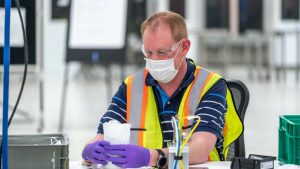 The COVID-19 coronavirus pandemic has upended our lives.
The COVID-19 coronavirus pandemic has upended our lives.
While many are laid-off or working from home, other essential workers continue to show up, doing their jobs to the best of their abilities, despite concerns for their health, essential workers including union nurses, doctors, fire fighters, EMTs, police, grocery workers, pharmacy techs, building trades, truck drivers, delivery services, machinists, letter carriers and others.
Schools are closed. We can’t visit elderly relatives in nursing homes, can’t go restaurants or get together with friends. Most of us are wondering how long this will last, how long we’ll be able to continue paying our bills and, for some, whether our jobs will still be there when social distancing requirements begin to lessen.
To get a sense of how working families are coping with the virus, the Labor Tribune is conducting an online survey of area workers to see how they’re dealing with this health and employment crisis. Here are the initial survey results.
Take the survey here.
We’re also talking with workers who participated in the survey. Following is the first in a series of short interviews with workers.
‘WHAT CAN YOU DO EXCEPT SHOW UP?’
A UFCW Local 655 member who also works for the Missouri Department of Mental Health and asked to remain anonymous, is still working at both of her jobs. “I am an essential worker,” she said. “I’m a cashier at Schnucks and work for the Department of Mental Health in the business office.”
She regularly sanitizes her work area, wears a facemask and gloves when she’s working at Schnucks, but still worries about her risk of infection. “I think overall there are concerns because we don’t know enough about the virus. I think that they have safeguards in place, not only the mask and gloves but the plexiglass. That’s a good thing.”
At the Dept. of Mental Health, she says, “We still have to work. We still have to make sure the bills are paid and that can’t be done at home.
“Whether you’re going to Schnucks or going to work, you’re still out there,” she said. “That’s a little upsetting, but what can you do except show up?”
‘DOING EVERYTHING THEY CAN’
Michael Goodwin, Teamsters Local 6, works in shipping at Anheuser-Busch and says he has been impressed with the measures the company has taken to keep workers safe.
Two weeks ago, his department eliminated a workstation. That created space for everyone to be at least six feet apart. Workers’ temperatures are checked every day.
“I think they’re doing everything they can,” he said.
Goodwin, 48, lives in DeSoto in Jefferson County, Mo. and plans to keep working until he’s 60. He’s been a Teamster 23 years. His wife is at home running an online business, and they have a 10-year-old and a high school senior who is wondering when the diplomas will be given out.
Meanwhile, Goodwin hasn’t been suffering from a lack of work – it’s been seven days a week for more than two months.
ALWAYS IN THE BACK OF YOUR MIND
Ken White, a member of IBEW Local 1, has been working reduced hours, but he doesn’t mind. It’s spring, and he also tends to 183 acres of farmland in Lincoln County near Troy, Mo.
“We’ve been working but we haven’t been working much,” said White, 61. ”I’m enjoying the hell out of it. Working a couple days a week is just fine.”
White has been seeing a lot of paper towels and cleaning supplies on the job site, currently a closed shopping mall, reflecting concerns about the virus.
“You’ve always got that in the back of your mind,” he said.
His farm produces crops, hay and prairie grass seed, and that’s been keeping him busy. His wife, daughter and grandchildren have been staying home, so the family has stayed out of danger.
What’s hard for White to understand is why people are in such a state about not being able to go out to dinner or to social events for a while.
“Everybody acts like eating out is such a great thing. It doesn’t make any sense to me,” he said.
Lincoln County, he noted, has already had 25 cases of COVID-19. “It’s just because people are being knuckleheads,” he said.
‘STRANGE NOT KNOWING’
J. Smith, another IBEW Local 1 member who works for Netcom at Boeing was on work-share for about a week. “I’ve been working, but the future work is still unknown,” he said.
“Most are working from home,” he said. “I am avoiding contact with Boeing employees in the factory, following the six-foot rule. I work with a fellow employee, but neither of us have traveled.”
His daughter, a teaching assistant in the Parkway School District, is off work but getting paid. His son, an IBEW Local 1 apprentice, has been out of work for a few weeks.
He’s trying to take it one day at a time, but says “It’s strange not knowing if there is any work.”
‘SURPRISINGLY NORMAL’
Brett Moeller, a young father who has been a member of Sheet Metal Workers Local 36 since 2006, said it sometimes seems strange how little his family’s life has been affected. His wife stays home with their one-year-old daughter. The biggest change for them has been to make fewer visits to the grocery store.
“My daily life seems surprisingly normal. The more normal it is, the more weird it seems,” he said.
His work recently has been finishing a school theater project. The workers have been doing a lot of hand-washing and staying six feet away. The project seems a little on the non-essential side, but they couldn’t just up and go home — they wouldn’t get unemployment. It wasn’t until April 7 that they were required to wear face covers.
“I am glad to be working,” he said. “It’s good to be working, it just feels a little strange.”


